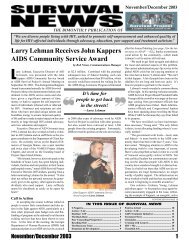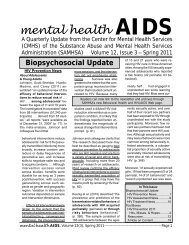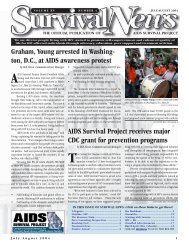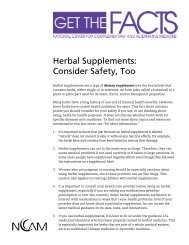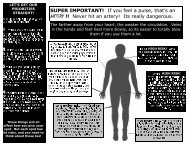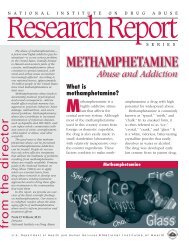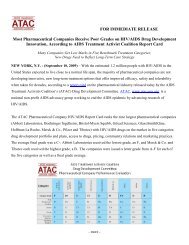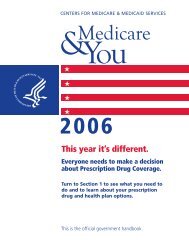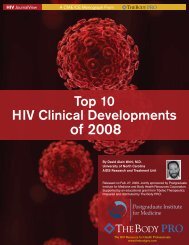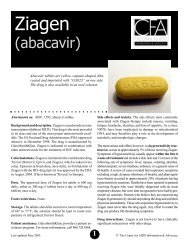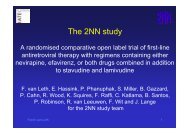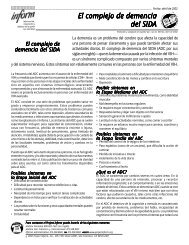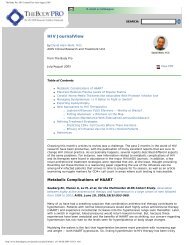WELLNESS STARTS WITH AWARENESS - CD8 T cells - The Body
WELLNESS STARTS WITH AWARENESS - CD8 T cells - The Body
WELLNESS STARTS WITH AWARENESS - CD8 T cells - The Body
Create successful ePaper yourself
Turn your PDF publications into a flip-book with our unique Google optimized e-Paper software.
Methadone<br />
wellness<br />
Sarz Maxwell, M.D., is a psychiatrist<br />
with the Chicago Recovery Alliance,<br />
and before that, she was with the<br />
Center for Addictive Problems methadone<br />
clinic in Chicago.<br />
Enid Vázquez: So, this is an issue<br />
about wellness. What do you want to<br />
say about methadone and wellness?<br />
Sarz Maxwell: Let me put it in the<br />
context of what methadone does. And<br />
to do that you have to understand what<br />
heroin addiction is.<br />
Our brains produce natural opiates<br />
called endorphins. We’ve all heard of<br />
them. For some reason we don’t understand,<br />
in people who will become addicted<br />
to heroin, the brain stops making<br />
enough endorphins. So for someone with<br />
this condition, taking opiates—whether<br />
it’s heroin or methadone or whatever—is<br />
exactly the same as someone with diabetes<br />
taking insulin. So not only does methadone<br />
promote wellness, but in people<br />
who have this disease of endorphin deficiency,<br />
which usually we see as heroin<br />
addiction—that’s the way it manifests<br />
itself, that’s how we make the diagnosis—<br />
methadone is necessary to wellness.<br />
Abstinence-based treatment for opiate<br />
addiction—it doesn’t matter what the<br />
treatment is, whether it’s three years of intensive<br />
residential, whether it’s intensive<br />
outpatient, whether it’s 12-step based—<br />
any treatment for opiate addiction that<br />
does not include methadone has a relapse<br />
rate of 90%. Nine-o. That would be like<br />
saying, “Well, 10% of people who are on<br />
just a protease inhibitor as opposed to a<br />
HAART [highly active anti-retroviral<br />
therapy, for HIV] regimen do okay, so<br />
let’s just start with that.” It’s insane. But<br />
… talking about methadone and wellness<br />
is a whole new slant on it because we don’t<br />
think about addiction as treatment in<br />
terms of wellness. We think about it in<br />
terms of goodness or badness.<br />
PA • September / October 2008 • tpan.com • positivelyaware.com<br />
Positively Aware<br />
EV: That’s great, because we’re going<br />
to go there … all the stigma, all the<br />
discrimination.<br />
SM: That’s a good way to lead off.<br />
That’s one of the problems, is that we<br />
don’t talk about methadone and wellness,<br />
we talk about methadone as goodness or<br />
badness.<br />
That’s because we don’t conceptualize<br />
addiction as a disease. We talk about it as<br />
a disease, but that’s bullshit. We don’t act<br />
like it’s a disease. In what other disease<br />
would I as a doctor say to someone, “Okay,<br />
I’ve had you in treatment, but you’re still<br />
sick so … get out of here.” It’s insane.<br />
How many people with diabetes are<br />
able to do without insulin? I keep bringing<br />
up that analogy because it is exact.<br />
Heroin addiction is caused by a deficiency<br />
of endorphins in the brain, just like diabetes<br />
is caused by an insulin deficiency<br />
in the pancreas. <strong>The</strong>re are some people<br />
who develop diabetes late in life because<br />
they had some sort of drug interaction,<br />
or because they’re pregnant, or because<br />
they’re overweight. And for those people,<br />
they may be able to manage their diabetes<br />
once they take care of that underlying<br />
condition. <strong>The</strong>y may be able to manage it<br />
through just diet. But for people with the<br />
disease, you’re not talking to them about<br />
getting off of insulin!<br />
People ask, “Isn’t methadone harder<br />
to get off of than heroin?” I don’t understand<br />
that! How hard is HAART to get<br />
off of? But we don’t talk to people about<br />
getting off of HAART. “This is something<br />
you’re going to take for a couple of years<br />
and then when your HIV is all over, we’ll<br />
wean you off it.” And of course, people say,<br />
“But they want to get off their methadone.”<br />
Doctor and advocate Sarz<br />
Maxwell on the science—<br />
and madness<br />
Interview by Enid Vázquez<br />
Of course! How many people want to take<br />
HAART?<br />
All I can do is rant, because the questions<br />
don’t have any answers, because it’s<br />
all fucked up. People who are addicted to<br />
opiates, the problem is not that they use<br />
opiates. It’s that they need opiates. <strong>The</strong>y<br />
don’t function without them. <strong>The</strong>y can’t<br />
function without them. And so the only<br />
options that are given to them are to not<br />
function because they’re not getting their<br />
opiates or to get their opiates through a<br />
system that doesn’t allow them to function.<br />
How many people with diabetes<br />
are able to do without insulin?<br />
EV: I remember these horrific stories<br />
on a methadone listserv years ago.<br />
<strong>The</strong> other doctor at your clinic was<br />
on it.<br />
SM: Marc Schinderman [of Center for<br />
Addictive Problems, in Chicago, Downers<br />
Grove, Illinois, and Westbrook, Maine].<br />
EV: People had to get to the clinic<br />
within these certain times, and go<br />
each and every day. <strong>The</strong> people in<br />
California were worried that if an<br />
earthquake occurred, they wouldn’t<br />
be able to get their medicine.<br />
SM: We still conceptualize methadone<br />
as candy, that we give to good little addict<br />
s and withhold from bad little addict s,<br />
and if they can’t get their candy today, oh<br />
well.<br />
Methadone is still working off rules<br />
that were established 25 years ago—just<br />
like everything else in medicine. Nothing<br />
has changed in 25 years, you know?<br />
But the rules are that for the first 90 days,<br />
people must come to the clinic six days a<br />
week. After 90 days they are eligible to ap-<br />
33




